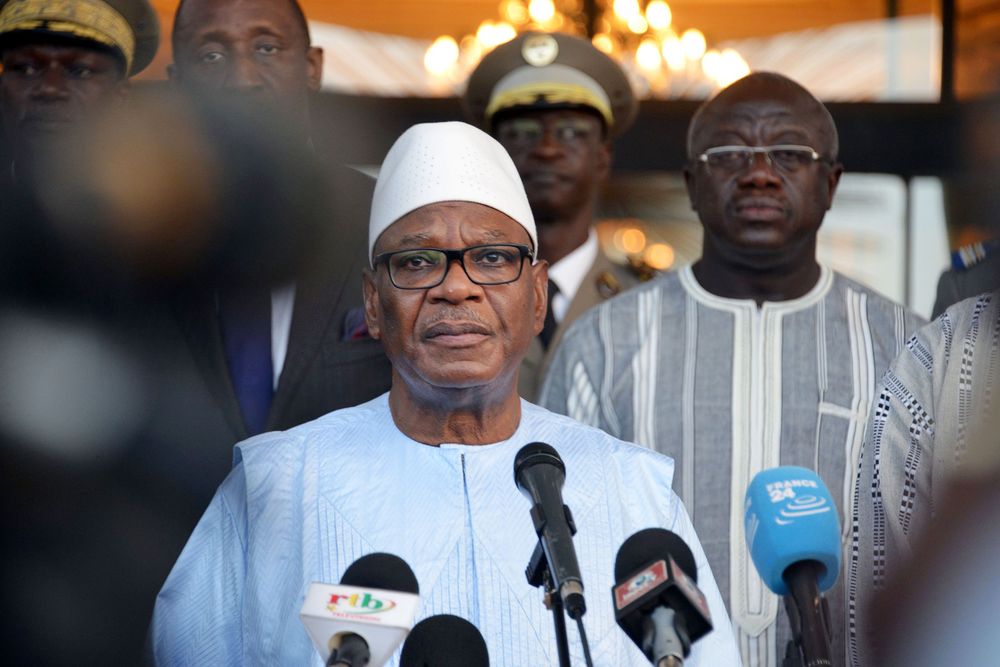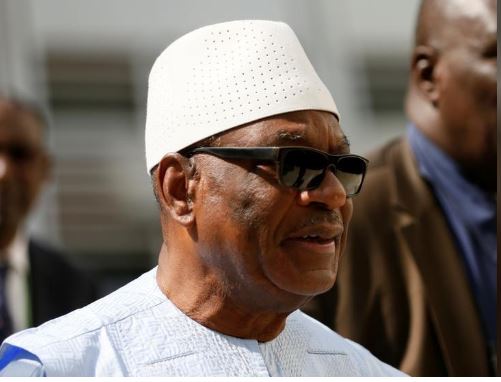Mali’s president and prime minister were seized by mutinous soldiers, plunging the country into deeper political turmoil. The EU has condemned the “attempted coup.” West African bloc ECOWAS imposes sanctions on Mali.

Mali President Ibrahim Boubacar Keita said on Tuesday he was resigning and dissolving parliament, hours after mutinying soldiers detained him and top officials from his government. “I want no blood to be spilt to keep me in power,” he said in a brief address broadcast on state television.
President Keita, Prime Minister Boubou Cisse and other top government officials were earlier detained by mutinying soldiers, worsening a national crisis in a country already grappling with a jihadist insurgency and mass protests.
It was not immediately clear who was leading the revolt, who would govern in Keita’s absence or what the mutineers wanted.
Earlier on Tuesday, soldiers took up arms at the military base in Kati, a town 15 kilometres (nine miles) from the capital Bamako, and began arresting senior military officers and civil servants.
DW correspondent Mahamadou Kane, who was in Bamako ahead of the leaders’ arrests, said: “More and more people are gathering at Independence Square in support of the M5-RFP movement that wants to see the resignation of the president and the prime minister Boubou Cisse. They seem to support the military but it remains unclear what the demands of the military are.”
Rebel troops surrounded Keita’s private residence in the evening and fired shots into the air before taking the lead into custody.
Cisse, who had earlier urged the soldiers to lay down their arms after the uprising kicked off, was also seized. One of the prime minister’s staff said the pair were being held at the army base in Kati.
Soldiers were then spotted moving freely through Bamako — a sign that they were making gains in the capital.
DW learned earlier on Tuesday that several high-ranking politicians and officials were arrested, including the Minister of Finance Abdoulaye Daffe and the chief of staff of the National Guard. State broadcaster ORTM was evacuated and later went offline, reported Reuters.
What has been the reaction?
The chairperson of the African Union Commission, Moussa Faki Mahamat, tweeted that he strongly condemned the arrest of Keita and Cisse and called for their release.
Vice President of the EU Commission also tweeted: “The European Union condemns the attempted coup d’etat underway in Mali and rejects all unconstitutional change.” He added: “This can in no way be a response to the deep socio-political crisis that has hit Mali for several months.”
The Economic Community of West African States (ECOWAS) earlier on Tuesday said soldiers had launched a “mutiny” and urged them to immediately return to their barracks. The bloc later decided to suspend Mali from its decision-making bodies, close its member states’ borders with that country and suspend all financial flows between its members and Mali. It also called on the ECOWAS commission to impose sanctions on the “putschists and their partners and collaborators.”
The French Foreign Ministry condemned the mutiny “in the strongest terms” and urged the Mali military to return to barracks. Over 5,000 French troops are stationed across the Sahel region that includes Mali to counter jihadi violence.
UN chief Antonio Guterres demanded “the immediate and unconditional release” of Mali’s president and members of his government.
“The secretary-general strongly condemns these actions and calls for the immediate restoration of constitutional order and rule of law in Mali,” a spokesman for Guterres said in a statement.
The UN Security Council is planning emergency discussions about Mali on Wednesday.
How did we get here?
The mutiny came after months of political crisis following the fallout from Mali’s parliamentary elections. In March, opposition leader Soumaila Cisse was kidnapped three days ahead of the first round of votes.
The second round of votes, in April, was disrupted in the country’s volatile north and central areas. Later, Mali’s constitutional court overturned the results of some 30 seats, a move that was advantageous for 10 candidates in President Keita’s party.
In June, public anger at the government’s handling of the elections spilt onto the streets in the capital Bamako. The June 5 Movement — Rally of Patriotic Forces, known as M5-RFP, have held further anti-government protests, with many demanding Keita resign. Fourteen people were killed during protests in July.
Kati saw a mutiny in 2012 that led to a coup d’etat that ousted then-President Amadou Toumani Toure and contributed to the fall of northern Mali into the hands of jihadi militants.

